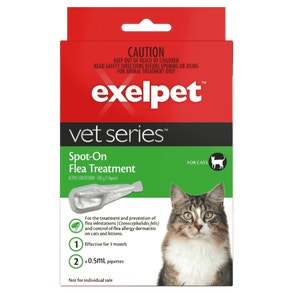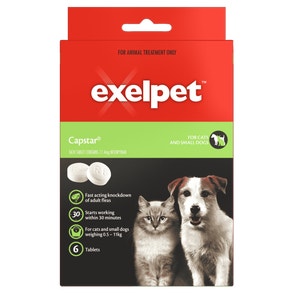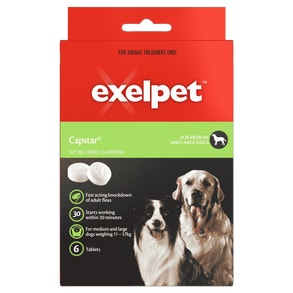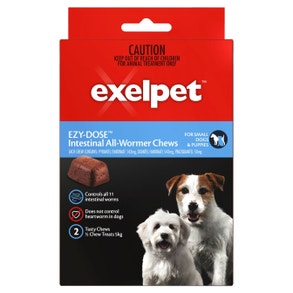Dogs and cats should be wormed regularly to remove parasitic worms which live in the intestines.
Intestinal worming is recommended at least every 3 months in adult pets. These worms can make your pet seriously ill, and some worms also pose serious risks to human health.
Intestinal worms spread easily between animals, so if you have more than one pet the risk of picking up worms increases. However, even pets which live on their own can become heavily infected with worms picked up from their environment.
Lifecycle of roundworms in dogs
Includes time on pet & in the environment
Breeding bitches and queens need worming more often. Puppies and kittens need regular worming from around 2 weeks of age. Dogs at risk of infection with hydatid tapeworm should be treated with a drug 100 per cent effective against hydatid tapeworm every 6 weeks.
Follow the treatment recommendation on the EXELPET™ product pack and worm all your pets at the same time to maximise protection. Different types of worms complete their lifecycle by different routes, finding their way into the intestine in a variety of ways.
Other things you can do to control worms:
Remove droppings daily from yard
Don't feed offal or raw meat
Clean out cat litter trays regularly
Don't let your pet eat birds, rodents, wildlife, slugs or snails
Clean your pet's sleeping areas regularly
Control fleas
Feed good quality prepared pet foods
Always wash hands after handling pets
Roundworm
Roundworms are very common in puppies and kittens, causing a range of gut problems, such as vomiting and diarrhoea, weight loss, poor coat condition and a pot-bellied look. Intestinal obstruction and death can occur in cases of severe infestation. One type of roundworm found in dogs can also be transmitted to humans, especially young children.
Hookworm
Hookworms live on blood sucked from their host and if untreated can be fatal. They can make dogs very sick, causing skin disease, abdominal pain, diarrhoea, anaemia and dehydration. Occasionally, hookworm can infect people.
Whipworms
Whipworms live in the lower bowel and are mainly a problem in adult dogs. They are easy transmitted via eggs that are able to survive for many years in the environment. Whipworms can cause diarrhoea, blood in the stools and gut pain. Long term infestation can lead to weight loss, anaemia and malnutrition.
Tapeworms
Tapeworms need an intermediate host to complete their lifecycle, so they don’t spread directly from animal to animal. Although most tapeworms are not serious, they can cause irritation around the bottom and scooting (rubbing the backside along the ground). One type of tapeworm is transmitted by fleas, so it is wise to treat your pet for fleas if you suspect tapeworm infection.
Signs of worm infestation
Worms can cause a variety of symptoms depending on the type of infestation. The symptoms may only become apparent when animal is heavily infected, and their intestines are severely damaged. Irritation of the bowel and anus, vomiting and diarrhoea, pot belly, poor growth and a dull coat are common signs of infestation.
The health risks to humans from worms range from mild to extreme and include: damage to internal organs with development of cysts (Hydatid Tapeworm), blindness (Roundworm) and intensely itchy red tracts in the skin (Hookworm). Children are particularly vulnerable because they love to play with pets, may be less diligent about personal hygiene and may also come into contact with pet faeces in sandpits or garden soil.
Explore our Warming products
Travelling with your dog
It is most important to maintain heartworm prevention while travelling. If you live in an area where heartworm does not normally occur, and are planning to travel to a heartworm area, you will need to start your dog on preventative medication before you leave home. In any doubt you ask your vet for an annual heartworm test to check your dog’s heartworm status




